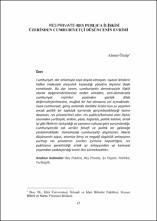| dc.contributor.author | Özalp, Ahmet | |
| dc.date.accessioned | 2019-10-23T07:08:52Z | |
| dc.date.available | 2019-10-23T07:08:52Z | |
| dc.date.issued | 2014 | en_US |
| dc.identifier.citation | Özalp, A. (2014). Res Private-Res Publica ilişkisi üzerinden Cumhuriyetçi düşüncenin evrimi. Memleket Siyaset Yönetim, 9(21), 47-70. | en_US |
| dc.identifier.issn | 1306-8202 | |
| dc.identifier.uri | https://hdl.handle.net/11491/4504 | |
| dc.description | research | en_US |
| dc.description.abstract | Cumhuriyet, dar anlamıyla soya dayalı olmayan, siyasal iktidarın halkın iradesiyle meşruluk kazandığı yönetim biçimini ifade etmektedir. Bu dar tanım, cumhuriyetin demokrasiyle ilişkili olarak değerlendirilmesine neden olmakta; anti-demokratik cumhuriyet rejimleri yüzünden günlük dilde değersizleştirilmesine, muğlak bir hal almasına yol açmaktadır. Oysa cumhuriyet, geniş anlamda özellikle Aristo’nun iyi yaşamın ancak politik bir topluluk içerisinde gerçekleşebileceği tezine dayanan, res private/özel alan- res publica/kamusal alan ilişkisi üzerinden yurttaşlık, erdem, yasa, özgürlük, politik katılım, ortak iyi gibi ilkelerin tartışıldığı ve zamanın ruhuna göre yorumlandığı, cumhuriyetçilik adı verilen felsefi ve politik bir geleneğe yaslanmaktadır. Günümüzde cumhuriyetçi düşünürler, liberal düşüncenin soyut, atomize birey ve negatif özgürlük anlayışının yurttaşı res privatenin sınırları içerisine hapsettiğini, res publicanın gerektirdiği ortak iyi anlayışından ve kamusal yaşamdan uzaklaştırdığı tezini ileri sürmektedirler. | en_US |
| dc.description.abstract | The republic, in its narrow sense, represents a form of political regime not based on the paternalistic; it refers its legitimacy form of political power by the will of the people. This narrow definition of the republic causes the evaluation of its in relation with democracy and because of anti-democratic republic regimes, in the daily life and language the devaluation that leads to an ambiguous state that it receives. However, the republic, in a broad sense, particularly realized by Aristotle's thesis of good life but politically within a community, based on the res private/private sphere and res publica / public life through the relationship between citizenship, virtue, law, liberty, political participation, the common good of the principles discussed and interpreted by the spirit of the time, called republicanism rests on the philosophical and political tradition. Today republican thinkers claim that evaluation of un-encumbered, atomistic individual and the concept of negative freedom in liberal philosophy isoleted citizens from res publica and restrict them into the borders of res private. | en_US |
| dc.language.iso | tur | en_US |
| dc.rights | info:eu-repo/semantics/openAccess | en_US |
| dc.subject | Res Publica | en_US |
| dc.subject | Res Private | en_US |
| dc.subject | İyi Yaşam | en_US |
| dc.subject | Politika | en_US |
| dc.subject | Yurttaşlık | en_US |
| dc.title | Res Private-Res Publica ilişkisi üzerinden Cumhuriyetçi düşüncenin evrimi | en_US |
| dc.title.alternative | The evoluation of republican thought in the context of relationship between Res Private and Res Publica | en_US |
| dc.type | article | en_US |
| dc.relation.journal | Memleket Siyaset Yönetim | en_US |
| dc.department | Hitit Üniversitesi, İktisadi ve İdari Blimler Fakültesi, Siyaset Bilimi ve Kamu Yönetimi Bölümü | en_US |
| dc.identifier.volume | 9 | en_US |
| dc.identifier.issue | 21 | en_US |
| dc.identifier.startpage | 47 | en_US |
| dc.identifier.endpage | 70 | en_US |
| dc.relation.publicationcategory | Makale - Ulusal Hakemli Dergi - Kurum Öğretim Elemanı | en_US |


















